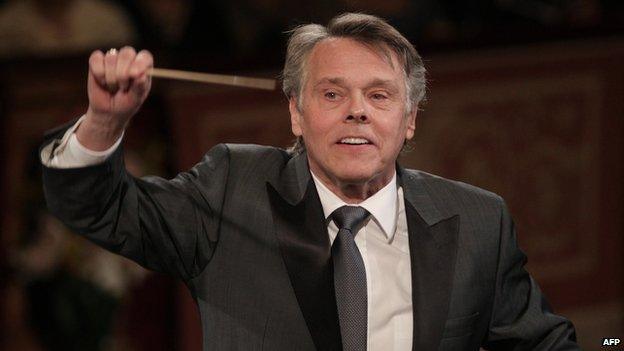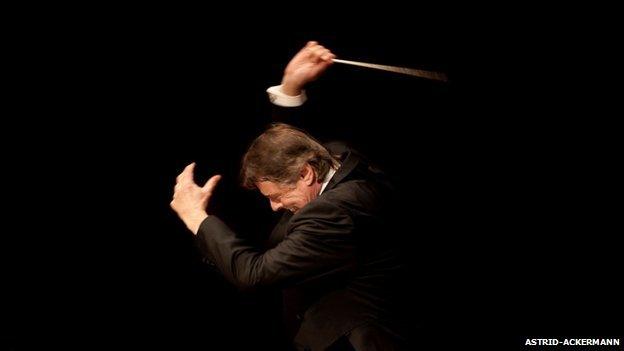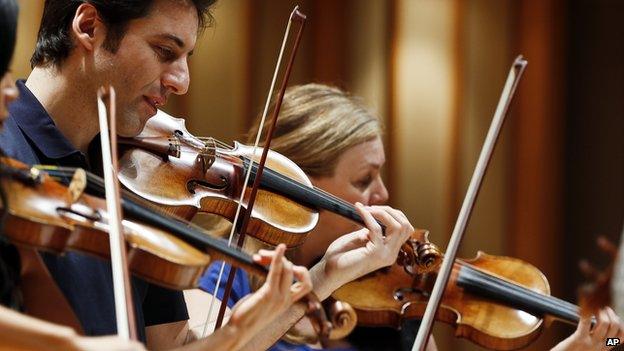How to conduct your staff
- Published

Mariss Jansons is widely considered to be one of the world's best conductors
Quite often management books look to the symphony orchestra for examples of leadership in action: the conductor on the podium, conjuring wonderful music from a group of performers who would be rudderless without the man or woman with the stick.
I've always been suspicious of this sort of metaphor, which is compelling mainly because it is so grandiose... it makes bosses feel good about themselves, and puffs them up with the idea that leadership is an art you can master with the right input.
But the other evening at the Barbican Concert Hall in the City of London, I had a chance to review my instinctive feelings, during an extraordinary performance by the Royal Concertgebouw Orchestra from Amsterdam.
They were playing music I don't know and (to be frank) don't really want to know: the huge, long, Symphony Number Seven by Anton Bruckner. But the performance was amazing.
We were sitting in expensive seats set to the side, because we bought too late to put us in the middle of the hall.
So instead of the traditional back view of the conductor, Mariss Jansons, we could see one side of his face, all the time. And it was utterly compelling.
Man among equals
Mr Jansons is 72, and born in Latvia. He has been Concertgebouw chief conductor for 10 years, and there is a deep regard for him among the musicians. Seeing him (and them) in action, I am not surprised.
With restrained gestures and the subtlest of facial expressions, he drew from the orchestra the most glorious performance.
This was not a leader in charge of a production; it was a man among equals, enabling the ensemble to flower, joining their efforts to his to evoke the spirit of the music.
It was one of three Bruckner symphonies performed on successive nights in London. They had had no full scale run-through of this huge work beforehand, no dress rehearsal. Some of the performers were new to Bruckner altogether.

Mr Jansons says it is his job to find out an orchestra's 'special qualities'
The rehearsals concentrated on the difficult bits, in particular the transitions of mood or speed.
Mr Jansons knew he could trust the musicianship of his superb players. What he had to do was to realise the possibilities of the ensemble.
No wonder the impact of it was so tremendous. Watching him sideways, I realised that what was happening was that effectively we were in on the creation of the music, so listening was almost as if it were being invented in front of our ears.
There was a revealing moment in the pause after the first movement. The conductor gave the tiniest of acknowledgements of satisfaction - so far - to the different orchestra sections; not a wink, but little movement of hands and eyes to indicate that what was supposed to be created was happening.
And it was so fresh, so of the moment, that we in the audience were part of the performance as well. Listening again later to the Radio 3 live transmission was not the same experience, even if my speakers had been up to the vast sonorities of Bruckner.
This was musical leadership of a very high order indeed, huge music conducted with abundant humanity.
And in Mr Jansons' enabling rather than autocratic style of leadership there were some real lessons for business people who look to conducting to show them how to run an organisation.
Tough application process
Afterwards, talking to a member of the orchestra, I got a few insights into the democratic structure of the orchestra, which may explain the balance of power between conductor and players.
The 120 players are members of the orchestra association, which has three seats on the orchestra's board.

Musicians from around the world apply to join the Concertgebouw
Becoming a tenured Concertgebouw member is difficult. Prized vacancies on the band may attract as many as 250 applications from all over the world.
These are whittled down, and then a nerve-wracking selection process takes place.
Applicants audition behind a curtain, listened to be a committee of the players with whom a successful musician will eventually play: about 16 members of the orchestra, including all the players of the section for which the applicant will eventually join. Peer group judgment.
This elimination round happens twice... and then there's a play-off with the curtain raised, so the selectors at last see who is playing for them.
But even after the choice is decided, there is still uncertainty: successful entrants to the orchestra face a probationary year, and their services may be dispensed with during that time. Not just a possibility: this happens.
No wonder the orchestra's standard is so high. No wonder a public performance can be realised on the spot in that miraculous way I heard (and saw) in London the other month.
A huge mutual trust between players and conductor, all working on top form to create an experience for themselves and the listener, realised by the musicianship of a very great conductor indeed, and the band's respect for him.
How much the bosses and managers of other organisations and companies could learn from that community of purpose.
'Natural process'
On the Royal Concertgebouw website there's confirmation of what orchestra members have told me about the experience of working with Mariss Jansons.
The site itself asks: What is Mariss Jansons' secret? How does he consistently manage to take his orchestras to a higher level and garner international recognition?
In answer it quotes from an interview in the Gramophone the conductor gave six years ago.
"It's my job," he told the magazine, "to find out the orchestra's special qualities and preserve them. Then, if through a natural process, my own individuality adds something - and theirs to me - then it will be fine."
A superbly modest summing up of what leadership can be. A natural process.
It has to be said that this sort of relationship is not a given, even at the Royal Concertgebouw.
One famous previous chief conductor (for 25 years), Bernard Haitink, is embroiled in a continuing row with the orchestra over what he says is his lack of involvement in its 125th anniversary celebrations last year.
Mr Haitink has vowed he will never again conduct the band. The feeling may well be mutual, though I haven't asked.
Sadly, however, the wonderful relationship between the orchestra and Mariss Jansons will soon be coming to an end. His health has been problematic for some years, and he has just announced that he will be giving up his chief conductorship next year.
So there is not much time left to hear a consummate musician utterly in tune with consummate players. And to witness a remarkable example of leadership in action, with the result of it blooming before your very ears.
Peter Day will be playing and talking about music that has influenced him (not Bruckner) on Saturday Classics on BBC Radio 3 on Saturday June 7 at 14:00.